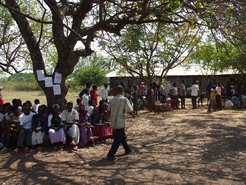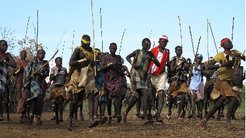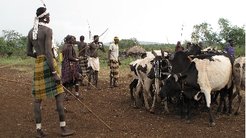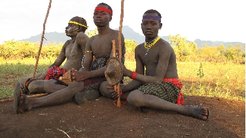Political anthropology of the Bodi funeral

In the lower Omo valley in South-West Ethiopia live the Bodi, a 6 000 people speaking a Surmic language (Nilo-Saharan family). They engage in cattle herding and cultivation, but their culture chiefly revolves around cattle. Twenty years ago, raids on neighbouring pastoralists or highland cultivators were still part of the Bodi way of life. For the last decades, the relations between these groups and the nature of the conflicts are undergoing noticeable changes.

On the eastern edge of the Bodi territory are the Dime, an Omotic group of cultivators. After Menelik II conquered the southern margins of his Ethiopian empire in the late nineteenth century, the Dime endured the rule of the northern Ethiopian settlers. Weakened by their exploitation by the latter, while the Bodi remained free and even obtained arms from the Northerners in exchange for game products, the Dime offered no resistance to the attacks of their pastoralist neighbours. If the large-scale raids have now stopped, a few Dime are still shot dead every year in road ambushes near the administrative town in Bodi territory on market day.
Since 2004, there is a new people living in Bodi territory: the Konso, a Cushitic group of cultivators. 5 000 of them have been resettled from their over-populated homeland further east into the most fertile land of Bodi as part of a governmental scheme. The administration deliberately or unintentionally misinformed the Bodi concerning the land they would have to give up to the Konso. Since then, a few Konso die every year in road ambushes, and Bodi people are also killed in revenge.
The Mursi, who live south of the Bodi, are very close to the latter both in language and culture. They tended to be periodically at war, the last one being in 2005. The currently lasting peace is tense, especially since the Bodi have caught a young Mursi man who had killed a Dime. Each time Konso or Dime are killed, the Bodi spiritual leader and spokesmen are put in jail until they hand the murderer over to the police. When such killings occur, the Bodi are now highly suspicious of the Mursi, accusing them of intentionally bringing trouble into their land.
Troubles also come from the recent lease of land to an Italian biofuel company. Here again, the agreement of the Bodi people has been obtained without them being fully informed about the extent of the lease. The Bodi are now alarmed by the shrinking of their land for grazing and cultivation.
As appears from these accounts of the current state of conflicts, the relations between cultivators, pastoralists and the administration are definitively entangled. If cattle theft seems to become insignificant, the land resources are clearly at stake.


I was drawn to the study of the Bodi death ritual when the Dime, at a peace meeting with political leaders and representatives of the communities in 2008, demanded no less than the ban of the second funeral in Bodi, called jeng. This ceremony was pointed out as a significant incitement for the young Bodi to kill.
The second funeral is held about one year after the death of an elder and lasts for several days: relatives and bond-friends of the deceased stage a mock attack on the burial place along with their finest oxen. Adorned in their personal cattle-coat colour, the killers sing of their exploits – those who have never killed have to content themselves with the singing of their given oxen. Not only Bodi but also Dime, Mursi, etc., bond-friends of the dead person are invited to come with their oxen. This may be the only ceremony for which they are expressly invited. Thus they may hear about the killing of their own people.

The Mursi have only been celebrating their second funerals in the Bodi fashion for a few decades. Because the recent acts of killing become public knowledge during these celebrations, the Bodi now pay careful attention to them, checking if the harassment from the administration they endure in the aftermath of road ambushes may have been caused by their Mursi neighbours.
This project deals with funeral rituals as a gate to explore groups’ relations, the possible inadequacy of Bodi warlike values with the increasing penetration of the state, and the tensions in the Bodi’s own political organisation, as the presently troubled time delays the transmission of authority over to the youngest generation.




